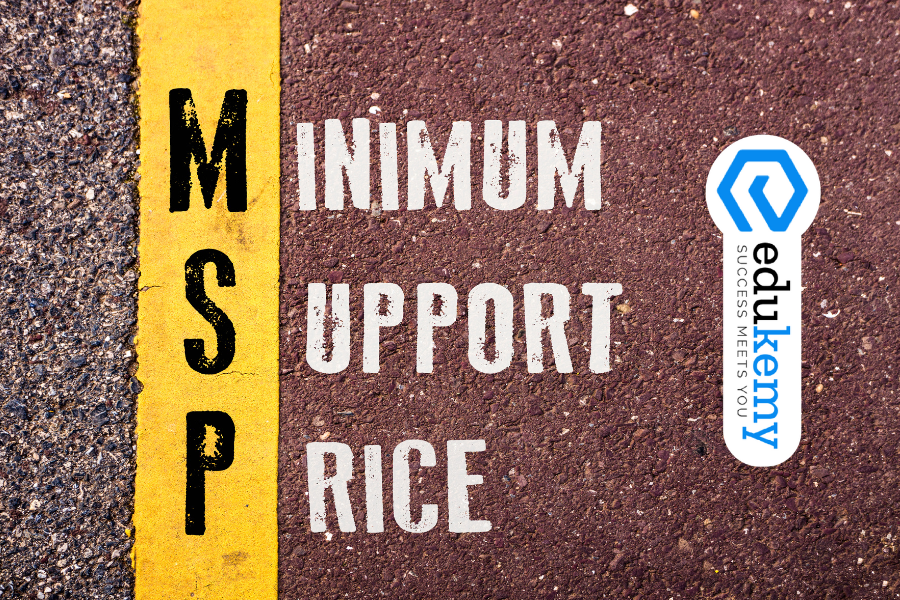
The Minimum Support Price (MSP) is a crucial component of India’s agricultural policy, aimed at providing economic assurance to farmers and promoting agricultural stability. Here are key aspects of the MSP system in India:
- The objective of MSP:
- The primary objective of MSP is to assure farmers that their agricultural produce will be bought at a remunerative price, ensuring them a profit for their efforts and encouraging continued investment in agriculture.
- Announcement and Purchase Operations:
- The government announces MSP for 24 major agricultural commodities twice a year, before the Kharif (summer) and Rabi (winter) sowing seasons. Purchase operations are organized through public and cooperative agencies.
- Role of Food Corporation of India (FCI):
- The Food Corporation of India (FCI) is responsible for actual procurement for the Public Distribution System (PDS) and buffer stock operations. The FCI purchases the produce at the “procurement price,” which may see a minor increase to account for inflation between sowing and harvesting times.
- Determinants of MSP:
- The MSP is determined based on the recommendations of the Commission for Agricultural Costs and Prices (CACP), an advisory body of the Ministry of Agriculture and Farmers Welfare. The CACP considers various factors, including:
- Cost of Production
- Changes in Input Prices
- Input/Output Price Parity
- Market Prices Trends
- Inter-crop Price Parity
- Demand and Supply Situation
- Effect on Industrial Cost Structure
- Effect on General Price Level
- Effect on Cost of Living
- International Market Price Situation
- Parity between Prices Paid and Prices Received by farmers (Terms of Trade)
- The MSP is determined based on the recommendations of the Commission for Agricultural Costs and Prices (CACP), an advisory body of the Ministry of Agriculture and Farmers Welfare. The CACP considers various factors, including:
- State Government Bonus:
- State governments may add a bonus to the MSP, enhancing the remuneration received by farmers for their produce.
- Procurement for PDS and Buffer Stock:
- The procured grains are used for the Public Distribution System, where they are sold at issue prices. FCI’s economic cost includes procurement, storage, and distribution expenses.
- Criticism of MSP:
- Some criticisms of the MSP system include:
- Promotion of rice and wheat at the expense of crop diversification.
- High water consumption by rice and wheat cultivation.
- Disproportionate benefits to large farmers, while many are subsistence-based.
- Increasing food subsidy burden, prompting calls for rationalization.
- Lack of alignment with changing food habits and a growing demand for protein.
- Some criticisms of the MSP system include:
- Crop Diversification Challenges:
- MSP has been criticized for acting as a hurdle to crop diversification, hindering the shift towards crops aligned with changing dietary preferences.
In summary, while the MSP system provides essential support to farmers, it faces scrutiny for its impact on crop patterns, water consumption, and subsidy burden. Balancing the needs of farmers with broader agricultural and economic considerations remains a challenge for policymakers.
FAQs
Q: What is Minimum Support Price (MSP) in India?
The Minimum Support Price (MSP) is a price set by the Indian government to protect farmers against excessive fall in the market prices of agricultural produce. It acts as a safety net ensuring farmers get a fair price for their crops, regardless of market fluctuations.
Q: How is MSP determined in India?
MSP is determined by the Commission for Agricultural Costs and Prices (CACP), which considers various factors such as cost of production, demand-supply dynamics, market prices, and input costs. Recommendations are made based on these factors and are then approved by the Cabinet Committee on Economic Affairs (CCEA).
Q: Which crops are covered under MSP in India?
MSP is announced for various crops including cereals (like rice and wheat), pulses, oilseeds, and some commercial crops like cotton. The government regularly reviews and revises the list of crops eligible for MSP based on factors such as demand, production, and market conditions.
Q: Why is MSP important for Indian farmers?
MSP provides assurance to farmers regarding the minimum price they will receive for their produce, which helps in stabilizing their income and encouraging agricultural production. It also serves as a crucial tool for food security and ensures adequate supply of essential commodities in the market.
Q: Are there any criticisms or challenges associated with MSP in India?
Yes, there are criticisms and challenges associated with MSP. Some argue that MSP distorts market prices, leads to overproduction of certain crops, and doesn’t effectively reach all farmers, particularly small and marginalized ones. Additionally, MSP policies can sometimes become politically contentious, leading to debates about their effectiveness and implementation.
In case you still have your doubts, contact us on 9811333901.
For UPSC Prelims Resources, Click here
For Daily Updates and Study Material:
Join our Telegram Channel – Edukemy for IAS
- 1. Learn through Videos – here
- 2. Be Exam Ready by Practicing Daily MCQs – here
- 3. Daily Newsletter – Get all your Current Affairs Covered – here
- 4. Mains Answer Writing Practice – here

